Why Young Men Are Giving Up on Love & Turning to Hate Incel
This conversation with Dr. Shannon Zimmerman delves into the complex world of incels, exploring their origins, motivations, and the impact of the internet on their ideology. It highlights the distinction between different types of incels, the role of misogyny, and the potential for violence. The discussion also emphasizes the need for understanding and addressing the underlying issues that lead individuals to adopt such harmful beliefs, advocating for prevention and support systems to help those affected.
A Feminist Foreign Policy Approach to Counter-Terrorism
This brief explores what a feminist foreign policy approach to counter-terrorism might look like. A key role of foreign policy is to ensure a state’s national security. However, the field of national security in most countries is deeply gendered. State approaches to addressing terrorism and violent extremism are no exception to this, despite clear evidence that gender-sensitive approaches to counter-terrorism and preventing/countering violence extremism are more effective. This brief highlights the value added by including feminist approaches to counter-terrorism and explores what such an approach might entail. Last, it describes how Australia might apply a feminist approach to its current counter-terrorism activities to ensure initiatives are more comprehensive, effective and sustainable.
Photo by Claudio Schwarz on Unsplash
Doctor Who and Humanitarian Interventions – How a Time Lord foreshadows the Responsibility to Protect
If pop culture is the audio-visual result of politics, then Doctor Who, the long-running science fiction series, provides prescient political commentary on evolution of the moral and legal arguments around humanitarian intervention. Premiering in 1963, Doctor Who follows The Doctor, a seemingly immortal Time Lord who travels through time and space. Inevitably, the kind-hearted Doctor becomes entangled in major historical and international events as they attempt to protect the human race. These well-intentioned interventions violate the Time Lords First Law of Time, which prohibits interference in events and acts as a thinly veiled allegory for the principle of non-intervention. How the Doctor justifies their interference, and the response they receive from those around them, serve as an apt illustration of the ever-changing attitudes towards the legality and justifiability of humanitarian interventions.
Incels: New Political Actors Emerging from the Manosphere?
The deadliest vehicle-ramming attack in Canada was proceeded by an opaque Facebook post that called for an ‘Incel Rebellion’. Just minutes later, a young man drove a rented van down a busy Toronto sidewalk, killing 10 people, and injuring 15 others. This tactic has been advocated for by al-Qaeda, endorsed by ISIS, and popular with other jihadist terrorists. In this case, however, the attack was undertaken by someone holding an entirely different ideology, the violent misogyny associated with the involuntary celibates or Incels.
Male-supremacy as a violent political ideology
Last Month, a man armed with a large knife entered the Westfield shopping centre at Bondi Junction in Sydney. He proceeded to attack over a dozen people before being killed by a policewoman. Video footage appears to show the attacker avoiding men and targeting women. Five of the six people killed in the attack were women, and most of those wounded were also female. Police have confirmed that a gender may have been a potential motive. At the same time, they said that this attack does not appear to be ideologically motivated.
A Crisis in UN Peacekeeping
This year marks the 75th anniversary of United Nations Peacekeeping. With 12 currently active operations and over 70 successfully completed, UN peacekeeping is one of the global body’s most effective tools to manage threats to international peace and security. Despite this, there is growing concern that UN peacekeeping is no longer ‘fit for purpose.’ Several of the largest UN peace operations are closing – with mixed records of success – and it has been almost ten years since a new mission has been deployed. So, what is causing this crisis of peacekeeping, and how did we get here?
Australia has invested heavily in a Pacific peacekeeping hub. So, where are the recruits?
Nearly two years after opening Blackrock’s value as a Pacific peacekeeping hub is not as clear. What can Australia do to leverage its existing efforts in the Pacific to help support pacific peacekeeping.?
The End of UN Peacekeeping in Mali Offers Little Hope for the Nation's Civilians
The end of MINUSMA is bad news of Mali’s civilians, who are increasingly targeted by Malian forces and mercenary groups in counter-terrorism efforts. These forces are likely to further fuel the expansion of jihadist violence.
The importance of peacekeeping to meeting Australia’s strategic objectives
The unclassified version of Australia’s defence strategic review only mentions peacekeeping directly twice. It refers to Australia’s ‘enviable international reputation as a capable country in military, peacekeeping, and humanitarian assistance and disaster relief operations’ and acknowledges that climate-change-driven disasters and mass migration could foster conflict and increase our region’s demand for peacekeeping. It seems to imply that peacekeeping has been and will remain a key activity for the Australian Defence Force, but Australia’s current commitments to peacekeeping are minimal, and the review provides no details on Australian plans to participate in future peace operations.
If Australia wants to meet the review’s recommendations that it meaningfully contribute to the collective security of the Indo-Pacific and to the maintenance of the global rules-based order, then it needs to seriously consider its role in UN peace operations.
Using popular culture to learn about genocide
Talking about the examples of genocide by Dr Who throughout the series, this interview discussed Dr Zimmerman's paper, 'Doctor Who and the Responsibility to Protect: Public Perspectives of Atrocity Crimes', which canvasses the depiction of genocide in this science fiction series, and how the language and treatment of this international crime in the TV show changes along with real-life events over the course of the series' history; and the use of science fiction as thought experiments in the study of political science.
Counter-Terrorism & Peace Operations
Academics and peacekeeping experts have raised concerns and noted the initial impacts of counter-terrorism efforts on UN peace operations. Building on this work, this brief draws on illustrative examples from the field to examine how the UNSC’s counter-terrorism framework has impacted the mandates and practice of the UN’s peace operations, particularly the large stabilization operations deployed in Africa. It shows that counter-terrorism efforts at the level of the UNSC have blurred the normative distinctions between peace operations and counter-terrorism to the detriment of the former. This brief concludes by providing recommendations to ensure that UNSC responses to terrorism and violent extremism do not unintentionally undermine the effectiveness of UN peace operations.
The Wagner Group is Bad News for Mali's Citizens and Its Stability
As Russia has turned its eye towards Africa, its private military companies have become more and more active in conflicts across the continent. In Mali they have been used to devastating effect.
The Responsibility to Protect and Counterterrorism
Dr Shannon Zimmerman writes on the relationship between R2P and counter-terrorism. She argues that both doctrines are compatible where emphasis is placed on protecting human rights.
Peace and Security are not the same thing
This blog post looks at a recent agreement between the UN Department of Peace Operations and the UN Office of Counter-terrorism. It interrogates why peace operations and counter-terrorism efforts have been kept seperate until now and notes some of the key challenges that might emerge if peacekeeping and counter-terrorism were to become too entwined. It includes that adding counter-terrorism tasks to UN peacekeeping mandates will likely make an already difficult job much harder.
The Manosphere and the Incels
Shannon and her fellow researchers aimed at investigating how we can Recognise the Violent Extremist Ideology of ‘Incels’. Shannon is on the show today to discuss this research, the ins and outs of the ‘Manosphere’ and what exactly an ‘Incel’ is.
Women play a critical role in diplomacy and security, so why aren’t more in positions of power?
In recent years, Australia has put an emphasis on bringing more women into its defence, foreign affairs and diplomacy ranks. But a new global index shows the country still has work to do to improve gender equality and promote women in security.
The Value of a Feminist Foreign Policy
The majority of countries have gender-blind foreign policies. While this may seem like a good thing, such policies fail to acknowledge and address existing gendered discrimination, inequalities, and violence. They also fail to take active steps to include women and other marginalized groups. Feminist foreign policy, in contrast, is designed to take into account and address these existing imbalances.
Misogyny as Violent Extremism
Misogynist violence continues to be seen as an individual, private problem when it in fact constitutes a major security issue. Australia is uniquely positioned to act due to its ground-breaking work on gender-based violence prevention.
Help Wanted: Women Leaders in Peacekeeping
Female leaders in peacekeeping constitute a visible representation of Australia’s commitment to gender parity.
Recognising the Violent Extremist Ideology of the ‘Incels’
In April 2018 Alek Minassian drove a van into a crowd
of people in Toronto, killing ten people. A few minutes
before, he had posted on Facebook, “The Incel rebellion
has already begun! We will overthrow all Chads and
Stacys! All hail the supreme gentleman Elliot Rodger.”



















